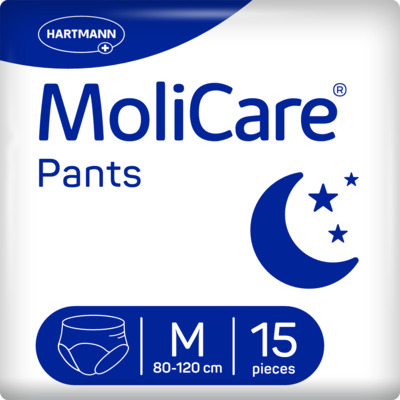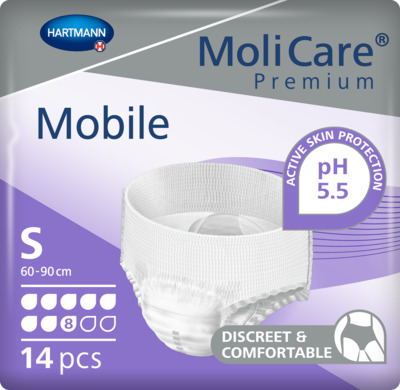Active living
How To Stop Urine Leakage When Coughing
For many, an unexpected sneeze or cough can lead to an embarrassing moment of urine leakage. This circumstance is linked with incontinence and can be both distressing and inconvenient. As the demand for solutions grows, understanding the causes and preventative methods for urine leakages has never been more relevant. In this article, you will understand how to help prevent urine leakage when coughing, how to identify the cause, and the practical strategies available to manage it, to ensure you feel confident in every situation.

How to Identify if You're Leaking Urine When Coughing
It's not always clear that you're experiencing urine leakage, especially if it's a small amount. If you notice dampness in your underwear straight after coughing or sneezing, it's a sign that you might be dealing with incontinence. If this happens, be sure to follow our top tips on managing incontinence to maintain peace of mind.
Another method is to keep a diary, noting down any incidents when you feel a leak, especially if this happens after coughing, sneezing, or laughing. This can help when discussing the issue with a healthcare professional who can help to determine the severity of the condition.
What Causes a Weak Bladder When Coughing?
When you cough, laugh, or sneeze, there's a sudden increase in pressure. This pressure pushes against the bladder, and if your pelvic floor muscles aren't strong enough to withstand this pressure, urine can leak out. This is common in those with a weakened pelvic floor or who have stress urinary incontinence. Coughing, whether it's short-term or chronic, can exacerbate the issue, leading to more frequent and noticeable leaks.
What is Stress Incontinence?
The involuntary release of urine during episodes that increase abdominal pressure, such as coughing, laughing, and sneezing, is a symptom of stress urinary incontinence (SUI). This condition arises due to weaknesses in the pelvic floor or the urethral sphincter, which controls urine flow.
The prevalence of stress incontinence is a widespread concern, especially among women. Studies suggest that approximately 9.6 million women can be affected by bladder problems
In contrast, the prevalence of stress incontinence in men is considerably lower, with one in twenty-five men over 40 will experience some form of urinary incontinence, although 18-25 year old men can be affected too.
However, incontinence cases can worsen due to prostate problems. It is always important to be aware of the risks of stress urinary incontinence in case situations worsen over time.
It's crucial to clarify that the term "stress" in stress incontinence doesn't refer to emotional or psychological stress. Instead, it relates to the physical "stress" or pressure exerted on the bladder during certain activities. When you cough, sneeze, or engage in strenuous activities, this added pressure can lead to urine leakage, especially if the pelvic floor muscles are weakened.

Why Does Coughing Cause Leaks?
Activities like coughing, laughing, and sneezing, or even certain physical movements create a surge in intra-abdominal pressure (IAP). This pressure pushes against your core muscles, including the pelvic floor, abdominals, and diaphragm. This can be managed using incontinence products such as our molicare premium mobile range to capture any leaks.
While IAP is a natural mechanism the body uses to stabilise the torso during various activities, sudden spikes in this pressure - such as those caused by sneezing or coughing - can be problematic. Especially for women who are pregnant, in the early postpartum phase, or managing conditions like prolapse, the pelvic floor might not have the necessary strength or reflexive function to handle these pressure spikes effectively. This inability can lead to a feeling of downward pressure on the pelvic floor or even result in urine leakage.
Seven Ways to Prevent Incontinence When Coughing
Bladder leaks during coughing can be distressing, but there are several strategies to address this issue:
Kegel Exercises: Regularly practicing Kegel exercises – also known as pelvic floor exercises - can enhance the strength of the pelvic floor muscles. While they can be done independently, some opt for Kegel weights or internal devices. However, it's essential to approach these tools with caution, as improper use can lead to complications.
Controlled Coughing Techniques: Techniques like controlled coughing and airway clearance can help minimise leakage. Adopting an upright posture before coughing or employing “The Knack” technique - tightening and lifting the pelvic floor before a cough - can offer protection.
Lifestyle Adjustments: Changes such as weight loss can alleviate pressure on the pelvic floor. Other changes, like, increasing water intake, reducing caffeine and alcohol intake, and quitting smoking can improve overall bladder health. Excess weight, especially around the abdomen, can put additional pressure on the bladder. Losing weight can alleviate some of this pressure and reduce instances of leakage.
Breathing Techniques: Proper breathing patterns can enhance the function of the inner core muscles, aiding incontinence. These techniques can be very effective for many.
Adjusting Posture: Adopting a tall posture, bending at the hips, or even sitting down before a cough can position the core muscles optimally, reducing the risk of leaks.
Surgery: For those with severe symptoms, surgical options might be considered. These can range from sling procedures to inflatable artificial sphincters. It's vital to consult with a medical professional to determine the best course of action.
Post-Illness Considerations: It's worth noting that after a cold or other respiratory illness- especially if the illness caused frequent coughing - an increase in pelvic floor symptoms is common but temporary, and these symptoms should resolve on their own. Urinary tract infections can also temporarily cause incontinence - as can being very constipated, so the best way to treat this would be to treat those individual conditions first. Chronic constipation and straining can also cause a weakened pelvic floor over time.

Combat Urine Leakages When Coughing Safely
In conclusion, while the involuntary leakage of urine when coughing, laughing, or sneezing can be disheartening, there are ways to prevent this that are easy to integrate into your lifestyle. By understanding what is causing urine leaks and seeking appropriate interventions, it is possible to regain confidence and control in no time.
Incontinence Products On Offer
Check out our range of incontinence products to help control urine leakages
FAQs
Is it normal to leak urine when coughing?
Leaking urine when coughing is a symptom of a condition called "stress urinary incontinence" (SUI). While it is common, especially among women who have given birth, individuals who have had certain surgeries or those of an older age, it's not considered "normal" as it is a sign of weakened pelvic floor muscles or other underlying issues, and treatment is available. SUI occurs when physical movement or activity –— such as coughing, sneezing, running, or heavy lifting –— puts pressure (or "stress") on the bladder, leading to involuntary urine leakage.
Can urine leakage be cured?
The treatment and potential cure for urine leakage depend on its cause and severity. Some potential treatments for urinary incontinence include:
- Pelvic Floor Exercises: Also known as Kegel exercises, these can strengthen the pelvic floor muscles and urinary sphincter.
Medications: Certain drugs can help treat urinary incontinence by calming an overactive bladder or increasing the amount of urine your bladder can hold.
Medical Devices: For women, devices like urethral inserts or pessaries can help prevent leakage.
Interventional Therapies: Procedures such as bulking agent injections can help close the bladder neck and reduce urine leakage.
Surgery: In more severe cases, surgical options like sling procedures or bladder neck suspension might be recommended.
Lifestyle Changes: Reducing fluid intake at certain times, avoiding bladder irritants like caffeine and alcohol, and maintaining a healthy weight can help manage symptoms.
It is essential to consult with a healthcare professional to determine the best treatment option for individual cases. In some situations, urine leakage can be significantly reduced or cured, while in others, it may be more about managing and reducing the symptoms.
Sources
PHS. (2023) Over Half Of UK Men Experience Urinary Incontinence. PHS. [online] Available at: https://www.phs.co.uk/about-phs/expertise-news/over-half-of-uk-men-experience-urinary-incontinence/ [accessed 07/11/23]
Sharma, A., (2010). Female Urinary Incontinence - Primary Care Management. BJMP British Journal of Medical Practitioners. [online] Available at: https://www.bjmp.org/content/female-urinary-incontinence-primary-care-management [accessed 07/11/23]

MoliCare® Premium Mobile 5 Drops
<h2>MoliCare Premium Mobile 5 Drops: The Solution for Incontinence</h2> <p>Experience the ultimate solution for managing moderate to very severe incontinence with MoliCare® Premium Mobile 5 Drop incontinence pants. These innovative pull-on pants provide the look and feel of ordinary underwear, ensuring discreetness and exceptional protection.</p> <p>With your comfort and security in mind, the discreet and adaptable design of MoliCare® Premium Mobile pants conforms to the shape of your body.</p> <p>The pH-balanced formulation ensures effective skin protection, preserving the natural balance and health of your skin. Featuring a three-layer absorbent core, these pants lock away urine, providing dryness and ensuring you stay comfortable and confident. The anti-leakage system offers extra security and protection, preventing any leaks or accidents. Odour neutralisers are added to provide long-lasting freshness and confidence, eliminating unwanted odours.</p> <h2>High Absorption Capabilities</h2> <p>MoliCare® Premium Mobile 5 Drop pants provide superior absorption capabilities, making them the perfect choice for managing moderate incontinence. With varying levels of absorbencies available, you can choose the one that suits your specific needs. The breathable fabric, anatomical shape, and absorbent core keep moisture away from your body, keeping your skin dry. Enjoy the convenience of easy removal with the quick tear-open sides of MoliCare® Premium Mobile pants, which is even suitable for those with severe bladder weakness!</p> <h2>Choosing your Size</h2> <p>Measure waist at the largest width between the waist and hips. Select the product size based on the below sizing.</p> <p>Small: 24-35 inches (60-90cm)</p> <p>Medium: 31-47 inches (80-120cm)</p> <p>Large: 39-59 inches (100-150cm)</p> <p>Extra Large: 51-67 inches (130-170cm)</p> <p>Fast, reliable delivery service for all your essential <a href="https://www.hartmanndirect.co.uk/" style="color:#0563c1; text-decoration:underline">HARTMANN Direct</a> incontinence products straight to your door. Take advantage of our convenient online ordering system and benefit from our price match promise, along with free delivery on orders over £50. Our friendly customer service team is here to assist you in selecting the right product for your needs.</p> <p> </p>
MoliCare® Premium Mobile 6 Drops
<h2>Discreet and comfort</h2> <p>Say goodbye to worries about unpleasant odours. Our Premium Mobile 6 drop incontinence pants are equipped with odour neutralisers, ensuring long-lasting freshness and confidence, so you can go about your daily activities with assurance.</p> <p>Experience superior absorption with our pull-on disposable pants in Premium Mobile 6 drop, which serve as a reliable and convenient solution for managing moderate to very severe incontinence. The discreet underwear-style fit offers you the freedom and flexibility you desire, while delivering unmatched dryness and comfort.</p> <p>Crafted from breathable fabric, the anatomical shape and three-layered absorbent core effectively keep moisture away from your body, ensuring a calm and dry sensation for your skin. The two-part cuffs act as a powerful shield against leakage, while the odour neutralisers keep any unwanted odours at bay, allowing you to live your life to the fullest.</p> <p>Removing the pants is a breeze, thanks to the quick tear-open sides, making them easier to use and convenient. Rest assured, our Premium Mobile 6 drop pants are effective even for very severe bladder weakness, providing the utmost protection you need.</p> <h2>Choosing your Size</h2> <p>Measure waist at the largest width between the waist and hips. Select the product size based on the below sizing.</p> <ul> <li>Extra Small: 18-28 inches (45-70cm)</li> <li>Small: 24-35 inches (60-90cm)</li> <li>Medium: 31-47 inches (80-120cm)</li> <li>Large: 39-59 inches (100-150cm)</li> <li>Extra Large: 51-67 inches (130-170cm)</li> </ul> <p>For further assistance, do not hesitate to contact our team today at 0800 028 9470, and be sure to order your MoliCare Premium Mobile 6 drop pants today.</p>
MoliCare Pants for Night
<h2>Incontinence pants for protection at night </h2> <p>Don’t let incontinence disturb your sleep. MoliCare® Pants Night is the simple and affordable solution for reliable protection at night. </p> <p>MoliCare® Pants Night incontinence pants for adults, also known as pull up panties, are worn like regular underwear and are available in sizes M and L. The absorbent core inside the incontinence pants quickly traps urine and ensures a pleasantly dry feeling on the skin even during the longer wear time at night. </p> <p>MoliCare® Pants Night help to keep intimate skin healthy by maintaining its natural pH value. At the same time, the absorbent core neutralises unpleasant odours. Soft and close-fitting double cuffs at the leg openings also prevent leakage. </p> <p>MoliCare® Pants Night are designed for reliable protection at night. You can recognise the nighttime incontinence pants by the moon on the packaging. They complement MoliCare® Pants Day incontinence pants which provide discreet protection during the day. </p> <h2>Who are MoliCare® Pants Night suitable for? </h2> <p>MoliCare® Pants Night are suitable for women and men with moderate incontinence who are looking for a reliable solution for the night. They lose up to 200 ml of urine at night and cannot always reach the toilet in time. <br /> <br /> They can go to the toilet independently or with a little help. MoliCare® Pants Night are suitable for urge incontinence. </p> <p>Highest wearing comfort and still affordable: MoliCare® Pants Night </p> <p>Thanks to fast absorption and odour-control, the incontinence pants provide reliable, comfortable protection while you sleep. MoliCare® Pants Night are extremely comfortable to wear. The soft, noiseless material means you will hardly notice the difference to regular underwear. </p> <p>MoliCare® nighttime incontinence pants are very skin-friendly. The slightly acidic pH value in the intimate area protects the skin from external contaminants such as urine. MoliCare® Pants Night help to maintain this natural pH value and protect the skin. </p> <p>You usually need no more than two MoliCare® Pants Day inco pants during the day and one pair of MoliCare® Pants Night incontinence pants for the night. This gives you a low cost yet high-quality round-the-clock supply of incontinence pants from HARTMANN Direct. </p> <h2>We are HARTMANN </h2> <p>MoliCare® is HARTMANN’s extensive range of continence care products. For over 40 years, we have been developing effective, reliable products that help people manage the challenges of living with incontinence. Our aim is to provide the right solution for every need. </p> <h2>Choosing your Size</h2> <p>Measure the waist at the largest width between the waist and hips and select the product size.</p> <p>Medium: 31-47 inches (80 – 120cm)</p> <p>Large: 39-59 inches (100-150cm)</p> <p> </p> <h2>Delivery service</h2> <p>Fast, reliable delivery service for all your essential <a href="https://www.hartmanndirect.co.uk/">HARTMANN Direct</a> incontinence products straight to your door. Take advantage of our convenient online ordering system and benefit from our price match promise, along with free delivery on orders over £50. </p> <p><strong>Need more help?</strong> Our friendly customer service team are waiting to help you choose the right product – call 0800 028 9470.</p>
